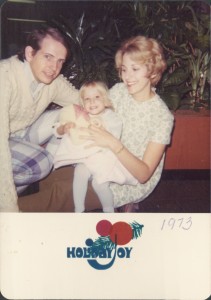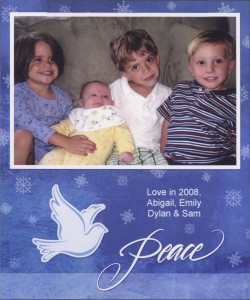
Making dreams real with some fireworks and electric sparks at Cinderella’s castle
I often wonder how many of us have been screwed up by Norman Rockwell paintings…like the famous family Thanksgiving picture with all the smiling faces, multiple generations gathered around the holiday dinner table. If our holiday dinners don’t look this way (which they rarely do unless you can convince a dozen cranky people to fake it really hard), we get depressed, believe ourselves failures at life (or at least family life), and fall into funks from which the typical American rescue is a bottle of Lexapro…or maybe Wild Turkey. (Depends on the family.)
Norman Rockwell meant well, I think. As did Walt Disney when he began building the famous theme parks that draw families by the millions each year. I doubt it was the intent of either to set up unrealistic expectations of joy to which we relentlessly aspire with very little real hope of attainment. Yet that is what they have done.
I attempted the Disney dream with my five-year-old daughter this Christmas. It was, in part, an attempt to escape the family holiday dinner table with all its barely suppressed tension and disappointment in exchange for a Christmas that looked nothing like Christmas, nothing like a Norman Rockwell painting, nothing like anything that could possibly make me compare my life to a dream I can’t say as I’ve seen anyone I know fully attain.

My daughter clowning around with Tigger at the Magic Kingdom
And besides, we all grow up with visions of Disney World as a magical place filled with fun, and joy, and laughter. Where these visions come from, I don’t know. I think they’re from the same place that sends visions of early parenthood as some period of deep happiness where Mom and Dad share the delightful responsibility of changing diarrhea-laden diapers at 3 a.m. and manage to smile through the whole smelly, sleep-deprived process.
So many parents with whom I was acquainted had encouraged me to take Heidi to Disney, insisted now was the time while she would still think all the princesses and residents of the Hundred Acre Wood were real. And I’d seen their Facebook posts and pictures of their own Disney trips, and somehow, I admit, I was taken in.
But once I began reading the 700+ page, Bible-thick Unofficial Guide to Disney and downloaded all its suggested apps, I began to worry. This was like planning battle strategy—hit this ride at this time to avoid a 180-minute wait. Get a Fastpass for Dumbo, and then go see the Mickey Philharmonic, and make sure to be back at your designated time for your 30-second ride aboard the floating elephant.
Don’t get me wrong. My five-year-old had a blast. And thank heaven for that. Else I would find it incredibly hard to justify the 25 miles or so I walked on hard pavement day after day pushing a Minnie Mouse stroller designed for short parents, carrying a 30-pound backpack, while plotting Magic Kingdom battle tactics on my Droid.
At first, I thought maybe I was a grumpy parent, that something was wrong with me. Why was I not loving Disney??? It was the same line of questioning I engaged in as the mother of a newborn. Why don’t I love every minute of the smelly diapers, the breast milk vomit on my shoulder, the 48-hour marathon runs of screaming diaper rash?
When I began berating myself over the phone to a friend, he said, “You do realize all those other parents hate it as much you, right?”
Um, no, I didn’t realize that. If that’s the case, why do millions of people descend on the park every year?
Because they’re buying into the Disney dream…in the same way we buy into the American Dream. Get everything you want, and then you’ll be happy. Make a wish, throw some electric sparkles into the air, and everything will be perfect ,and the wicked witch or Captain Hook will run away.

One dream come true: a grateful five-year-old
Don’t get me wrong. I believe in dreams, probably more so than the average person who has had the intelligence to give up on the impossible before divorcing twice and switching jobs about a dozen times. But Disney isn’t really about dreams, at least not the kind that are achievable when you make less than $1 billion a year. All Walt Disney has proved is that if you throw enough hard cash at something, you really can make the impossible real. Bill Gates and Steve Jobs have done the same thing with a lot less plastic and electric hoopla.
And after a few days at Disney and a fair amount of eavesdropping as well as philosophical chats with parents stuck in the same two-hour line with me waiting for photos with Princess Merida, I began to see that I was not alone in wanting this active vacation for couch potatoes to end as soon as possible.
While walking down a beautifully manicured path in the Animal Kingdom, I overheard a mother say to her teenage daughter, “I haven’t been here in 10 years, and I don’t think I’ll be back for at least another 10.” Dragging her feet and sighing, she continued, “This place is a mess.” (She was referring to the crowds and the spectacle, mind you, not the trash. Disney hires a massive cadre of folks who spend their days sweeping up every scrap of paper and displaced water bottle within three seconds of them hitting the ground.)
I found myself commiserating with mothers pushing baby strollers who wanted nothing more than to get back home to Nashville…and London (and why would you fly across the Atlantic to see this place???) I listened to fathers snap at their sons, “Enough already. No more whining, no more talking, just be quiet.” I heard moms and dads bickering on the ferry boat departing the Magic Kingdom, perfect fireworks blasting off in the background over Cinderella’s Castle. But was anyone watching them? No, just Heidi and me. Everyone else was facing the exit sign for the ferry, anxious to get off, get home, and put the Disney dream behind them.
My ex-husband told me I should take Heidi here again one day, maybe when she is 21, to let her “relive the magic.” I actually guffawed. If my daughter can think of nothing better to do with her 21st birthday than go to the plastic kingdom, I have done a poor job of raising her. African safari, kayaking Norwegian fjords, hiking the Great Wall—any of these requests I’m willing to consider. But not Disney World. Never again.
You see, I’m all about magic…real magic. The kind you find when rafting down real whitewater on the New or Colorado Rivers, not some fake river flowing through the Animal Kingdom.
It might have been worth it to see Heidi dance with Tigger in full delight or wrap her arms around Minnie Mouse’s waist. But you know what? She was just as thrilled last fall standing under the largest intact T-Rex skeleton in the world at the Field Museum in Chicago and posing in front of a giant Brontosaurus’ thigh bone.
But the really tough thing about Disney is the way it distracts. It distracts so intensely that the families visiting forget everything but checking off all the rides on their list and getting the autographs of all the “characters” for their six-year-old. It’s not like gliding into Glacier Bay on a kayak or slipping down the canals of Venice on a gondola where you experience take your breath away spectacle of an all-engrossing, thank God I’m alive and breathing and seeing this kind.
By my last night at Disney, I’d had quite enough. Tired and cranky as a toddler, I was trying to push Heidi’s stroller through a mob scene watching the nightly Electrical Parade at the Magic Kingdom. When a “cast member” chastised me for stopping the flow of traffic so my little one could get one last glimpse of Mickey gliding by on a float, I turned on her with all my Disney angst and let loose a flood of not epithets but something close. Needless to say, she left me alone, and I knew suddenly Disney was not the place for me anymore than a cage in a make-believe Serengeti is any place for a warthog.
I still don’t plan on spending Christmas anytime soon trying to create a Norman Rockwell painting in my dining room…but I sure as heck won’t be watching pacing tigers in “Asia” who are trying to figure out how to break through the glass wall that separates them from the tourists they’d very much like to eat. I’d rather see the tigers where they belong…in India…and myself where I belong, too—in a setting where magic is real and doesn’t require an electrical cord to make it run.

Two months into new motherhood: recognize that “deer caught in the headlights” look?
It was almost like I was meant to read Mel Robbins’ column in the August issue of SUCCESS magazine. It was the night before my (ex)husband and I were to finally sign the separation agreement that would formally end our association as husband and wife and dissolve any claims we might have on one another. It was 11 p.m. I picked up the magazine there on the ottoman, flipped through it, and landed on Robbins’ essay,
“Fight For Your Happiness.”
I wouldn’t say I needed to read Robbins’ column that night. My days and nights of soul searching were long passed. In fact, they had passed a good six months before I even asked my husband for a divorce. But her essay verified for me what few people, particularly unhappily married ones, are willing to acknowledge—that holding a doomed relationship together for the sake of the kids is…well…perhaps among the worst things you could do to your children.
I wasn’t having any cold feet, mind you. But sometimes it helps to know you’re not a lone wolf in the wilderness. In her column, Robbins talks about a close friend who decided to leave her marriage of 23 years. The friend’s announcement came as a shock. As Robbins points out, the couple had highly successful careers, three children, a beautiful home, took fantastic vacations together, and had lots of money. Their life was perfect…or, as is so often the case, it appeared so.
Robbins notes of her friend, “Inside, Lisa felt miserable. She and her husband had become roommates—they hadn’t touched one another in years. She laughed less and less. She gained 30 pounds.” The only thing they had left in common, Robbins says, was their three children.
So the two decided to divorce, and their kids said, “Now everything makes sense.”

Our first getaway after Heidi’s birth…and the last photo where the smiles are real.
What struck me about “Lisa’s story” was how similar it was to my own and how similar it is to that of so many people I care about. While some might read Robbins’ essay, which encourages readers to make the hard changes that ultimately lead to joy, as a call to action, I read it as a cry for honesty.
We may laugh about the old adage of “keeping up with the Joneses.” But most of us do it even as we recognize we’re doing it. The big question here is: WHY?
I’m not sure I have the answer. I’m no better than the average–I probably hung onto my marriage years longer than I should have. I recognized it was moving onto the rocks even before my daughter was born, and there’s nothing like bringing a child into the world to make a rocky coast even more treacherous. I’ll never forget our first Thanksgiving after Heidi’s birth. She was two months old, and my best friend, who was single at the time, joined us for the holiday. After we’d cleaned up dishes from the noon meal, she said to me, “I want to have a happy little family just like yours, Debbie.”
Full in the throes of postpartum depression, a newborn on my hip, my business running at full throttle, and my active duty Navy husband rarely in the picture, I was floored by her statement. I was at one of the lowest lows in my life.

A moment of “for the camera” bliss on the Cayman Islands.
I failed to notice, however, that to anyone on the outside looking in, my life looked grand. A year earlier, I had completed construction of my dream house following marriage to my high school sweetheart. My business was growing by leaps and bounds, gross income doubling every year. Things were so good, in fact, that eight months after Heidi’s birth, her dad retired from the military, and we lived secure in the fact that we could more than manage on one income. To celebrate his retirement and the newfound freedom of our lives, he and I left Heidi with the grandparents for three weeks and went on a luxurious nearly month-long vacation—a week in the Florida Keys, a week in the Caribbean, and a week lounging around on Sanibel Island. We would follow that up two years later with a trip through Northern Europe, and every October, we rented a house on the northern Outer Banks for a week in celebration of Heidi’s birthday.
This was life at its very best, yes?
Hardly.

The “perfect” family Christmas portrait.
As is so often the case, what is visible on the surface is hardly indicative of what lies beneath. Behind all the smiling photographs of a perfect family life, things were not so wonderful. Today I look at professional photographs from the Christmas after Heidi turned two and am amazed at the happy expressions on my face…on my husband’s face. As I finished dressing into black velvet for the occasion, he told me he wasn’t going to participate in the photo shoot because it was a farce. And he was right. It was. He and I were no more in love at that point than a cow is happy to eat a patch of crown vetch. But I finally convinced him to play the game. The result? Falsely blissful Christmas photos for posterity.
If this sounds familiar, just wait. It gets better.
When I complained, about two years after Heidi’s birth, about the wreck of my marriage to a close friend, she puzzled over what to do. She believed, the child of divorced parents herself, that maintaining the family unit was critical. After a few moments of consideration, she said, “Have you considered having an affair?”
Had it indeed come to this?

Heidi and her dad during the family’s annual birthday beach getaway.
Yes, it had. And I spent the next two years of my life trying to decide if I was doing my daughter any favors by maintaining a marriage with a man I no longer loved.
Because what I had to consider was whether or not it made a difference if my husband and I rarely showed affection in front of Heidi, whether or not it mattered if family dinners were typically strained and difficult, whether or not my daughter would adopt all of this lack of intimacy and tenderness between her parents as a confirmation of its “normalcy.” Did I want her to grow up and settle? To say to herself “Well, I guess this is how love is; I guess this is what marriage looks like.”
Was it going to benefit my daughter for me to “fake it” with her dad for the next 12 to 15 years?
I ultimately decided the answer to that question was a resounding “no.”
I had decided that the best things I could give my daughter were my honesty and my happiness. And if I gave her those two things, it would likely also increase my chances of finding love that was real…because I was about to be real, to stop the charade of the perfect life I’d been carrying on, well, since early adulthood at least.
And what does real love look like? Well, as a friend of mine said recently, “Real love sure as hell isn’t something you can clock in or clock out of.”

Honest joy at last: On the Skydeck in Chicago with my daughter one year after “the end”
Yet that’s exactly what my ex and I had done. And it’s what thousands of other couples do every day, denying each other intimacy because it’s inconvenient, because they’re busy, because they’re hurting and don’t want to hurt anymore, because they’re afraid. So they give and receive love when it’s comfortable and deny its dispensation and acceptance when it’s not. And eventually, love is gone completely…if it ever really existed in the first place…because it has lived like a houseplant that everyone keeps forgetting to water regularly.
And when a relationship reaches that point of dryness and wilt, it’s typically very hard to save.
But that doesn’t mean one has to give up and settle for a life that looks perfect but sure as hell isn’t. As “Lisa” discovered, you can always choose happiness. And you might even find yourself surprised by how that choice our culture so often deems selfish (probably because so much of the culture lives with its absence and so must justify it) changes not only you…but the people you love.
The same friend who cautioned me against the dangers of “clocking in and clocking out” on love has had no easy ride in this life, but, as Robbins noted in her essay, happiness is not always the easiest choice to make. Sometimes you have to fight for it. My friend did, and he lives by his own special creed on this one: “If I have lived my life without happiness, I have lived it in vain.”

One of my best holiday memories: Thanksgiving with my oldest friend and chosen “sister”
As I write this, people everywhere are suffering. Even among my small circle of acquaintance, the trouble is great. One of my colleagues is watching his life partner, who was first diagnosed with breast cancer, now struggle with cancer in her bones, lungs, liver, and abdominal cavity. Another friend is watching an old school friend fight for his life to recover from cardiac surgery. Meanwhile a dear friend’s boss and his wife try to cope with the loss of a child, and one of my clients is about to see her husband go into surgery tomorrow to remove a cancerous tumor from his kidney.
This is just the tip of the iceberg.
My oldest and dearest friend and I talk almost daily about the trouble in this world, how a day does not seem to go by where someone we know and care about is not struggling. And we talk, too, about why life has to be this way, why it seems to get more and more heartbreaking the older we get.
We are in our mid-30s, part of that unenviable “sandwich” generation, caring for young children, caring for ailing, aging parents, watching our friends and acquaintances struggle with their first signs of the onset of deteriorating bodies and lives. Illness, death, infidelity, divorce, births, neuroses—we are watching it all like a grand drama here in our own lives.
It is hard sometimes not to feel hopeless.
“I think it’s only going to get worse,” Sarah confides to me one night.
“I think you’re right,” I agree, realizing that despite everything we’ve been led to believe, life does not get easier with age and wisdom.
When she tells me about one of her friends who just lost her mother and sister in the last year, then struggled with her husband being in the ICU on the brink of death for weeks, only to lose a son in a car accident shortly after her husband came home, I tell her, “She should write a book.”
“About what?” Sarah asks.
“About how she has survived it,” I reply, thinking I would surely drive my car into a tree if so much tragedy befell me at once.
“Her women friends,” Sarah tells me. “That’s how she says she has gotten through.”
It might strike some people as odd that the woman did not say her family had pulled her through, so enamored are we as a culture with the idea that families are the be all and end all of existence. But that, as I and many of my women friends know, is, more often than not, a tragic myth.
Years ago, a couple I knew lost a son who was in the military. Always the loving pair with a big happy family (they had three other children) to outside eyes, this death tore them to pieces. One grieved with tears and talking; the other withdrew. They did not understand one another. Their more than two-decade old marriage dissolved within the year.
Why do families so often fail at love in the most critical of times?
It is a question to which I do not have the answer, though I have seen it often in my own life and in the lives of the people I love most dearly in this world.
Mark Twain once quipped that “familiarity breeds contempt,” and that may be true to some degree. But perhaps the greater truth is that the loving family that stands by us through thick and thin is as much a myth as Prince Charming and “happily ever after.” Yet we buy into it nevertheless, wondering what is wrong with us when our spouses, children, parents, aunts and uncles don’t provide the succor we need in times of crisis.

Taking a break from the dysfunctional family Christmas: my dad and Heidi
An acquaintance mentioned to me recently how his parents had this grand idea of having a summer family get-together where everyone stayed in a rented vacation house for a week—parents, kids, grandparents, sisters, brothers…everyone. “They think it’s going to be some big happy family,” he remarked. “But it’s never been that way, and it won’t be this time either. That’s just not how we roll.”
I don’t know if it’s how anyone rolls, to be quite honest.
We don’t choose our families, not really. We may get to choose our spouses, but most of us are so young and stupid when we do that that we might as well be picking out the cutest puppy at the pet shop on a whim of temporary adoration. It’s difficult to ask people whom we have not chosen and who have not chosen us to give us their all. Maybe they don’t like us. Maybe we don’t like them.
The old saying goes, “Blood is thicker than water.” I don’t know if that’s true. When one of my friends tells me my mother is crazy, I reply, “Yep, you’re right.”
And then I thank heaven for my friends. If I had to rely on my family to get me through the tough times, I’d be in dire shape.
Ironically though, it is with our disgruntled families that most of us spend our precious free hours—our vacations, holidays, birthdays. What should be the happiest days of our lives are peppered with disappointment, disillusionment, and sometimes even verbal brawls because we try to impose our vision of “the family” onto a group of people who maybe really don’t have a damn thing in common other than a blood line.
I know a handful of people who have made a stand against the drama. One couple I know who found each other late in life skip the family drama entirely for the holidays and have all their close friends over for Christmas dinner instead. I also have some friends that hold a “dysfunctional Thanksgiving”—a gathering of friends who have eschewed their relatives for this iconic American holiday.
I’ve decided it’s high time I do the same. This year I’m skipping Christmas. I have a long history of dysfunctional holidays that I’ve decided it’s high time I put in the past. From relatives who get into tear-inducing fights post-Christmas dinner to stressed out women who cook and bake for days out of obligation instead of love, I’m fed up. I’m taking my daughter to Disney World. And given my low tolerance for mass consumerism and waist-high people, it’s a grand testament to just how fed up I am.
Maybe one day when all the relatives who drive us crazy are gone and we’ve all divorced and remarried to people we actually like, my friends and I will join together for holidays we can actually enjoy among families we have chosen. Until then, do not be surprised to find me on a beach halfway across the world come Christmas and New Year’s…with no blood relative in sight, save perhaps my daughter.
Because life is too short to spend it being miserable among people who no more want to be with us than we want to be with them.
Posted by Deborah Huso on Oct 14, 2012 in
Men,
Motherhood,
Musings I spend a lot of time in airports. And if you really want to get the pulse of human nature, there is no better place to find it than in an airport–or on an airplane–in the rush to board or deplane. This is where people show their true colors. And the colors are not pretty. We’re not talking sunny yellow and soothing insane asylum lavender (which is, by the way, the color I painted my office). We’re talking angry orange and dire black.
I can’t tell you the number of times I have lifted heavy suitcases for pregnant women when plenty of able-bodied men were about. Or the number of times I have seen elderly ladies taken out by the roller suitcases of businessmen. But a recent tripped to Chicago topped it all.
I was suffering from a minor wrist injury and had my right hand in a brace when my five-year-old daughter and I boarded a plane in Detroit on leg two of our trip home. When I struggled a bit trying to get my suitcase in the overhead bin with a bum hand, Heidi called out from behind me, “Can someone help my mommy, please?”
Nothing. I dropped the suitcase. Heidi repeated her question in a plaintive voice four more times with no reaction from any of the passengers seated around us. I looked down the aisle and met the gaze of a flight attendant. “I’m sorry, but I have bad hand,” I said to her. “Could you help with this suitcase?”
Remarkably, she shook her head and turned away. (And in case you’re wondering for the sake of future flight planning, this was Delta.)
Then what I can only admiringly call a “bad ass grandma” appeared behind Heidi. Petite but feisty, she said loudly, “I cannot believe with all the men on this plane, not a one can get up to help you put that suitcase away!”
Still there was virtually no reaction from anywhere, save first class. A young man from business class finally met the call to action and stowed my suitcase for me.
Next item: climb over young businessman to access my window seat. He was sitting there in his aisle seat engrossed in his iPhone. With my good hand clutching the fingers of my energetic preschooler, I said, “Excuse me.”
No reaction.
“Excuse me, sir.”
Still nothing.
I was beginning to think I was the victim of some horrible practical joke. I knelt down to put myself at eye level with the seated businessman glued to his handheld electronic device, and said, “I’m sorry, but I have to sit beside you. Could you please let me in?”
That finally worked. He got up and let me in.
Once I had Heidi and myself buckled into our seats, I sat there wondering over this latest experience of human decency gone awry. I don’t expect too much of people, men in particular. I’m a self-made businesswoman who knows how to wield both a weed whacker and an orbital sander. But just because I can do everything most of the time when required does not mean I do not appreciate acts of basic human kindness.
Like men who open doors for me. Or young people who offer to hoist my luggage into the overhead bin on an airplane.
But basic human kindness has become an increasingly rare commodity. When a man holds a door for me these days, it almost bolls me over so rare is the occurrence. And when a businessman in an airport actually lets me go first to get off a plane rather than running me down in his mad rush to get to wherever, I find myself pleasantly surprised.
But I don’t think this is how things should be. Fellow contributor Susannah tells me she thinks the trouble is that men are scared to be kind to women because there are women who are offended when a man offers to carry their bags or pay for their dinner.
Um, really?
Who are these women?
I’m a feminist. I believe I can do whatever a man can do for the most part, though there are some areas where I fail. I can’t, for example, swing an ax for hours on end. But I suppose if I really wanted to be able to swing an ax for hours, I could build up the strength to do it. But just because I am smart and capable doesn’t mean I don’t ever want a gesture of respect or assistance. I am human, after all. And I have to wonder about women who take offense when a man commits an act of basic human kindness.
I really don’t think this is the problem. What woman in her right mind would get annoyed if a guy opened a car door for her or bought her dinner on a first date? It is no different from when I help an elderly woman find her seat on an airplane because her eyesight is no longer so good. It’s a small matter of honoring one’s fellow creatures as human beings deserving of care and respect.
I don’t believe men are the problem or feminism is the problem. I think our culture is experiencing a disturbing decline in basic human decency, and I wish I could pinpoint the answer as to why.
I cannot.
I just know it has reached epidemic proportions.
The one advantage to all this rudeness, however, is that it provides an excellent filtering system. For example, if a man fails to open a door for me or fails to buy dinner on a first date, that’s it. He’s done. And if an acquaintance fails to show proper empathy for a friend or colleague in need of comfort, I know instantly that person is not worth my time or energy. The playing field of people who understand basic human kindness and basic modes of showing respect has narrowed so much that it’s become quite easy to dismiss potential friends, lovers, and colleagues as complete duds on first acquaintance.
But the question remains–what is going on here? It wasn’t so long ago that a person who did not help an elderly neighbor with her groceries, hold doors open for women and old folks, and at least offer to foot the bill at dinner gatherings would be socially rejected as a numbskull. But now it’s perfectly acceptable, apparently, to be rude and self-centered.
I had the pleasant experience this last week of having a door held for me by my 10-year-old second cousin in Chicago. “After you,” he said. And when he and his brother received gifts of soccer jerseys from Norwegian relatives, without any prodding from their parents, they put them on and then pleasantly posed for pictures from trigger-happy relatives with cameras who thought they were cute. These young men will be rare commodities, I fear.
Decency isn’t that hard a skill to master. You would think otherwise though by how many people lack it, of course. As Susannah, who is training her 10-year-old son in the arts of social grace, says, “It’s really not that hard to hold a door open and say, ‘How are you?’ It should be a social reflex.”
Unfortunately, it’s not.
The social reflex these days is to ignore your surroundings and scroll on an iPhone while buildings burn and women give birth in the aisle four feet from your airplane seat. Oh yes, and you’re an M.D., too, but let’s just forget that for right now, as it would be awfully inconvenient to offer your expertise and aid on your vacation trip to Panama.
The problem here with this “ME” attitude, however, is that it isolates. And, as any history major knows, isolation only leads to a dangerous disconnect from reality and society.
If you don’t offer yourself to others, they sure as hell are not going to offer themselves to you.
So next time you see a single mother struggling with a stroller, three suitcases, and two toddlers, offer a hand. Because the thing about basic human kindness is this: just like the more popular mode of toxicity, it’s contagious as hell. Make a mom smile, and you’ll smile, too. And honestly, wouldn’t you rather see O’Hare or Hartsfield-Jackon as places of opportunity rather than places of massive rush and stress. Care for your fellow man, and I guarantee, in times of trial, he will return the favor.
Posted by Susannah on Sep 5, 2012 in
Girlfriends,
Motherhood I have a guilty confession to make: I am hooked on Desperate Housewives. Though I haven’t faithfully watched every season, for its final spring season, I was glued to my television set on Sunday evenings. Of course, the joke in our house has always been which housewife I’m most like—I’ll let you draw your own conclusion on that one. But the more interesting dynamic in this show, and why I am so addicted, is how, in the end, the women stick together and will do just about anything for each other. Though I’d be hard-pressed to cover up murder for my friends, I have realized that, in many ways, there are a lot of women out there who’ve got my back…and vice versa.
This is how I came to realize that although not necessarily desperate or filthy rich, my friends at the bus stop are my circle, my circle of wagons, that is. They are the ones I go to on a daily basis to cover for me (albeit not for murder).
Last spring, I had the opportunity to go away for six days, leaving my husband at the helm. I’m at home full-time. He works full-time. I’ve been away for girls’ weekends, and we both know that he can take care of the kids for a day or two. He’s just never had the opportunity to do so for such an extended period. He was a good sport, and although apprehensive, he was glad to step up to the plate.
My week away went fine. I returned to find two healthy, if a little bit scraggly, kids. The house was not up to my comfort level as far as cleanliness goes, but it wasn’t in a state I couldn’t fix within 48 hours either. The kids seemed more independent, and my ten-year-old son even gave me a genuinely enthusiastic hug when he saw me. My husband, Jorge, admitted that with all the anxiety he felt before my departure, he actually thought it was good for the three of them to be alone for those six days. He felt closer to the kids and more appreciative of all I do.
But that’s not the whole story, of course. The success of the week was in part due to the women that helped him out—maybe not dressed to the nines like Gabby or as wealthy as Bree, but nonetheless they are the women on whom I depend when I need help, and they were there for my stand-in, too—my husband. Every afternoon while I was away, a different mom picked up one or both of my kids, gave them a snack, supervised their homework, and often let them stay for dinner. My husband still had to miss three hours or so of work a day, but he probably could not have pulled off the temporary single parent thing without my women friends.
The most interesting part of this whole story was that Jorge was afforded a glimpse into the circle of us not-so-desperate bus stop moms each morning. At about day five, he expressed some concern over what he interpreted as irresponsibility among the bus stop gaggle of women. I can’t remember his exact words, but he commented about how one mom wasn’t there one of the afternoons to get our kids so another mom took them. He went on to describe how our kids (8 and 10) were left alone at home for ten minutes while that parent picked up another child. He was surprised to hear the question one morning at the bus stop: ‘Who will be at the bus stop this afternoon to get the kids?’—in the event that one of the moms couldn’t make it on time.
While to Jorge the idea of a mom just not showing up on time without any advance notice was disconcerting, I thought nothing of it. I’m constantly late to the bus stop or forgetting that some after-school activity has been cancelled. Sometimes I’ve not shown up at all, only to realize my mistake when I get a call from Dee or Suzan, who have rounded up my kids on my behalf.
As we stand there in an early morning haze, we pass out tissues or spare gloves and coordinate after-school pick-ups. We run errands for each other. We take each others’ kids in the evening.
But our value to one another doesn’t stop with the kids. Often we stand on the corner well after the bus has pulled away with our children, sometimes gripping warm coffee mugs, as we exchange the joys and fears of our lives as wives and mothers. Not infrequently, it’s my connection with those other bus stop moms that gets me through the day, the week, and even the year. Though a few of us are dressed and ready for work, many of us work part-time or from home, so we can frequently be found in slippers and sweats, the raw frustrations of the morning rush still seething in our brains.
One morning, I was so frustrated with my daughter–all forty pounds of her sassy, eye-rolling, foot stomping little body. What was I doing wrong? What was wrong with her? Should I take her to a psychologist? Would it get better? What are reasonable consequences? And is locking her in her bedroom for the next 10 years an option?
The four of us who dawdled that morning stood there, contemplating this small crisis. The other women listened to my ranting non-judgmentally, and all commiserated at some level. One admitted to having a similar morning with her daughter. One offered a book suggestion. Another mom with a teenager gave me the long-term perspective, promising a reprieve for a few years, but then some notched-up intensity later. This more experienced mom told me it’s almost like her daughter can’t control her wackiness. So much of these behaviors are spawned by hormones, which makes it difficult to tease out the real issues from those magnified by a body and mind going through puberty.
Of course, intellectually, I knew everything these women told me was true, and I knew it before I ever arrived at the bus stop that morning. But to have these women reassure me validated my frustrations and made me feel less alone. I left feeling better about everything, regardless of what might happen with my daughter when she returned home from school that day. And I knew I was not a terrible mom. My case was not hopeless. My bus stop cohorts had assured me my relationship with my eight-year-old was within the range of normal.
That morning was not an unusual experience.
Our bus stop conversations give us the chance to vent about our kids’ slipping grades, to learn which teachers are the best and which are the worst, who to call for evening babysitting help, and what to make for a quick dinner that tastes divine. We swap diet tips, parenting tactics, and favorite novels. We support job changes, returns to school, career setbacks, and family crises. We know whose mother has just been diagnosed with terminal cancer, whose child is seeing a therapist, who has tried which anti-anxiety med, and whose husband forgot his wedding anniversary.
On a certain level, my relationship with these bus stop moms is mundane, a completely normal, everyday thing that I think I often take for granted. (That’s why it never crosses my mind to worry when I’m 15 minutes late to pick up the kids.)
But thanks to my husband’s perspective on the bus stop gaggle, I can appreciate the genuine community our little circle provides. He saw one of the best gifts of my life outside of my immediate family. Jorge reminded me in a way that there are times when the most meaningful part of my day may simply be the ten minutes I stand on that corner with those other moms.
Posted by Susannah on Jul 14, 2012 in
Motherhood 
What I found under Dylan’s bed…see that half-petrified webbed foot?
Lying is bad. I teach my kids, at great lengths, not to lie. My husband and I are honest to a point that I believe borders on reckless. But this week I found myself in an out and out lie. I lied to my kid. He’s 10. And I think he bought it. Someday when my son reads this, I hope he’ll forgive me, though I pray he won’t become privy to my blog postings until he’s well over 18 and I’m drooling onto my oversized bib while flirting with the plastic potted tree next to me.
As it goes with all lies, I had no intention of spinning this tale. It started with a practically unheard of desire from the kids to clean out their rooms. And it wasn’t just a ‘dust the baseboards and sort through the books’ kind of clean. This was a clean where he removed every item from his bookshelves, worked with my husband to convert his bunk bed to a loft bed, ditched large pieces of furniture, and sent boxes and boxes of ‘treasures’ to the basement for safe-keeping (or until the Goodwill Fairy made her clandestine visit).
There’s nothing like cleaning out a kid’s room to offer insight into just how well the house is being maintained. Careful housekeeping is not a particularly well-honed skill of mine, but I feel like I can keep order and an acceptable level of cleanliness in a relatively respectable manner for the few rooms that are visible from the front door. As far as the basement and second floor goes, all bets are off. That being said, I was surprised at the amount of dust and crud that were unveiled as my son disassembled his bedroom into the living room.
The pile of Lego pieces, random coins from around the world, dust bunnies, lonely puzzle pieces and empty Pop-Its shells offered a sad review of my lack of attention to details in the recesses of his room. Though most of these items were easily dumped in the bin or reassigned to their respective places, there was one item my son uncovered that was tough to identify. It had obviously once been a living creature. It seemed to belong to the amphibian/reptile/creepy crawly class of creatures. And it was completely desiccated.
In a way that only a mother can, I brought to mind my son’s past 10 years and all applicable forays into small creatures, regardless of how brief. Goldfish, aquatic frogs, beta fish, hermit crabs, Russian Dwarf Hamsters, Fancy White (stinky) Mice, various earthworms and caterpillars, mealworms from science class, and a Spotted African Frog. All of these creatures had experienced proper burials in a kind of mass grave in the corner of the back yard with a lovingly handmade cement octagon for a headstone, complete with glass marble gems and the first pet’s name ‘Quinky’ etched in the concrete. All but two. It was unnecessary to empty out matchboxes or save mini-cereal boxes for the Spotted African Frog or the Russian Dwarf Hamster, as no bodies were ever recovered. They were both deemed MIA, and a memorial service was conducted in corpus absentia.
We never solved the mystery of the escape of those two residents of the ten gallon glass aquarium which served as home to many of Pet Smart’s best. At one point, Dylan was convinced that it was a cursed aquarium that off-gassed in a conspiracy to kill all his pets or, in the case of the Russian hamster and Spotted African Frog, caused them to run for their lives.
The hamster disappearance was likely related to a rodent problem we once had. Little house mice. About the size of a Russian hamster. It was the same winter that Fuzzy escaped. Did Fuzzy join ranks with the others and start her own family of Ham-Mice and eventually succumb to the trap? Or is she living out her days in our shed, nibbling on the bags of fertilizer and the lawn furniture cushions. I’ll never know as I desperately pleaded “it’s a man’s job” to mouse trap duty and disposal for months following the escape of Fuzzy.
But it’s the Spotted African Frog that my mind quickly reeled to that evening as I was examining the pile of miscellanea from behind my son’s bookshelf and under the radiator. I could see vague spots, a long leg extended and a distinctive little webbed arm sticking out as if to say, “Yes! Freedom! I’ve made it.” Yet how true in life that when we get something we’ve been dreaming about, we are often left rather dried out and alone.
I started to tell my son that it was definitely his frog. But then I remembered the moment he came to me when he was about seven, eyes welling over with tears. He said that his frog was gone, and he didn’t think he could ever keep anything alive. Every pet that he had cared for had died (rather quickly I might add.).
I remembered trying to comfort my frog-mourning son. I had exaggerated the significance of this sad announcement, mentally multiplying it by a quadrillion, as again only a mother can do. I began to worry about his emerging self-image, self-confidence, ego, sense of well-being, ability to develop lasting long-term relationships, placement on the autism spectrum, indicators for future drug and alcohol abuse, emergence of OCD behaviors, and the chance of developing a psychopathic personality disorder. And I quietly held him till he stopped crying.
That moment was etched in my mind. And it all came flooding back as I squatted on his bedroom floor, examining the pile of crud.
And that’s when I lied. He made it easy by suggesting the remains looked like a lizard. A ‘lizard’ had never made our pet list. But there were lizards where we went to the beach in North Carolina. And ostensibly one little critter could have sneaked into the beach house, run up the carpeted steps, crept into my son’s bin of Legos, and hitched a ride north. .
It’s all possible, if not probable. Especially when the dehydrated creature looked like a frog. An African Spotted Frog. From Pet Smart.
I know that caring for pets is a significant part of growing up. Learning responsibility. Learning gentleness. And learning that when you lose something you love, it will hurt. You’ll cry and you’ll talk about it. But you’ll move on. The pain will slowly be replaced with softer memories, and there will be other joys that will trickle in, eventually leaving more happy yesterdays than sad todays.
It’s just that Dylan had learned this lesson. Numerous times.
I didn’t feel the need to rehash it all as we were crouching on his floor surrounded by the chaos of a disassembled bedroom. So I lied.
I agreed and confirmed that it did, in fact, look like a lizard. The little lizards that scampered around the pool and up under the planks of the second floor decks at the beach.
Sweeping it up amidst the other dust and debris of a 10-year-old boy’s life, I thought about how much my son had changed from that tearful little boy who was heartbroken about a lost frog. He was now closer to launching. Closer to leaving. Closer to acne and girlfriends and college and heartbreak and all-nighters and all that is and ever will be about becoming a man, a husband, and a father himself. And something tells me that no matter how upright and honorable a man he becomes, he’ll know when it’s appropriate to turn a frog into a lizard and give some of the debris of life a little sweep under the rug.
Posted by Deborah Huso on Jul 1, 2012 in
Men,
Motherhood,
Relationships,
Success Guide If women’s level of power in America is at an all-time high, why is their sense of adequacy at an all-time low? You’ll find some of the answers in Anne-Marie Slaughter’s recent and controversial essay, “Why Women Still Can’t Have It All,” in the latest issue of Atlantic Magazine. In it, she talks about her own feelings of inadequacy in juggling a demanding, high-powered career and the raising of two sons, remarking about her not always successful superhuman efforts, “I’d been part, albeit unwittingly, of making millions of women feel that they are to blame if they cannot manage to rise up the ladder as fast as men and also have a family and an active home life (and be thin and beautiful to boot).”
If you’re like millions of other working women, you might breathe a sigh of recognition at those words. How many days have I worked myself into a frenzy of stress, meeting inane deadlines, racing to get to daycare to pick up my daughter at a reasonable hour (or maybe going to dance class first because, after all, I have to exercise to maintain the figure of a 25-year-old when I’m pushing 40), coming home to put together what truly amounts to a pathetic dinner (thank heaven my daughter is only four and thinks making spaghetti takes skill), while I fold laundry while watching her finish her meal, then answer e-mail on my Blackberry while I give her a bath, and often find my quality time with her is accidentally falling asleep beside her in her bed after a 10-minute bedtime story.
And I’m not even married.
Slaughter is though. And while she acknowledges her husband is largely responsible for making her rise to the top possible (he took care of the kids while she was hours away in D.C. all week for two years), she does not once mention in her essay of many thousands of words making time for him. It’s about kids and career.
And, unfortunately, that’s exactly the kind of outlook that has led millions of American women to divorce high-powered husbands while their friends looked on in incredulity. Are the tables going to turn on American women (who are, by and large, responsible for initiating 80 percent or more of divorces)? Probably not. Men just don’t have the same high standards we do when it comes to relationship satisfaction. Lucky for us, I guess.
Pity for them.
I’m not suggesting Slaughter doesn’t love her husband or that she doesn’t value him. She obviously values him since she suggests that one way for women to climb to the top professionally is to “marry the right person.” That would be someone like her husband who is willing to take on responsibility for home and kids when she is away. And honestly, I couldn’t be happier that at least some men are willing to do this, even if only some of the time. But um, is that all the guy is good for? For me, it’s just a little too reminiscent of the perfect hostess/housekeeper 1950s housewife. Marry the person who will help you advance your career and keep you comfortable.
We’ll never know Slaughter’s take on the husband’s role (though we suspect being a lover has very little to do with it given her long hours) because she doesn’t go into it. But we do know she asks people to introduce her as a “mother of two sons” alongside all her professional accomplishments. She does not, however, ask to be introduced as the wife of Princeton University professor Andrew Moravcsik. Maybe she thinks her audiences already know this.
My point is, however, when did women, who have regretted for centuries their insignificance in the lives of husbands who were out in the working world, decide to be hypocrites and forget the men in their lives? Or at least overlook them a lot. I’m speaking of professional women, of course, and I know a lot of them. Some of them are devoted wives; some of them, however (and I’ll admit I’ve been guilty myself at times), have come to see marriage as a convenient partnership where the benefits accrue in a rather lopsided fashion.
Part of the trouble here, as is so often the case, is the shifting landscape of gender roles. I don’t know if Slaughter makes more money than her husband, and, thankfully perhaps, they enjoy professional parity at least, but there are an increasing number of women who have outstripped their husbands professionally and financially. And that’s where things get tricky.
A close friend of mine was persistently convinced during the seven years of my marriage that a likely source of the trouble between my husband and myself was the fact that I made more money than he did and, later, when he chose to be a stay-at-home dad for three years, I made the money, period. She insisted this just didn’t sit right with men. I persistently disputed her.
But when I look back at how frequently my former spouse defended his contributions to the household, even when they were not being questioned, I wonder. Because I’ve seen resentment on the part of female friends and acquaintances who have lower-earning spouses or stay-at-home dads for partners. They rarely mean to but they cannot help but see the guy’s role as somehow diminished because he is either not bringing home the bacon or not bringing home as much (or more) than she is.
What’s going on here? Isn’t this what we wanted? Isn’t this what our mothers’ generation fought for? For us to have equal earning power with men? And to have no glass ceilings?
Sure it was.
But remember the old adage, Be careful what you wish for.
I’m not suggesting for a moment that I’d like to see American culture go back to a 1950s model. I am beyond grateful for the fact that I can be economically independent as a woman. And were it not for the freedom I have had to grow professionally and financially, whether married or not, neither I nor my daughter would enjoy the opportunities we have to live far richer and more meaningful lives than the women who went before us.
But there is a problem here. Men are becoming largely insignificant, at least in the lives of women who can pull off six-figure salaries or better. Because even if he knows how to do laundry and change a diaper, well, you could always hire a housekeeper and a nanny. So if the sex isn’t over-the-top or if he’s not just plain enormously charming, what exactly is his point here outside of offering a sperm donation?
This is a question, I’m afraid, more and more men are asking themselves. And we women aren’t helping matters. Because the plain and ugly truth is, there are an awful lot of high-income earning women married to men who just aren’t in the six-figure category. Why? Well, my theory is that rich and powerful men really don’t want competition. So those of us with brains, no matter how beautiful we are, are not likely to land any millionaires. If you check out the spouses where the wife is earning as much or more than a high-earning husband, my guess is you’ll find the two of them have been together since before either one of them was making much of anything. Women who have chosen to delay marriage until they themselves are financially secure are not likely to get too many proposals from men playing at the top of their game in high-paying fields.
So is my friend right? Is it hopeless to expect men and women to co-exist in a mutually loving, respectful relationship where the wife is bringing home the bacon and the husband is cooking it or maybe bringing home a basket of eggs instead?
It’s not an easy question to answer, especially given the archetype many of us still hold, sometimes against all reason and education, that men are the providers and protectors. It’s not just men who hang onto this idea and feel themselves less than men if it’s their wives who have the bigger bankroll. Women buy into it, too, even the liberal, executive-level women who have chosen as their life partner an incredibly worthy guy who, despite all his intelligence, charm, and decency, has an annual paycheck of $50,000. Or maybe, because daycare is so darn expensive anyway, he’s decided to stay home until the kids hit school age while she goes into work every day at a law firm.
Is it possible to maintain love, respect, and passion under this scenario that seems so in conflict with biology, tradition, and the Jungian archetypes of our unconscious brains?
The answer is “yes,” but you better be prepared for some complex choreography:
1) Never forget for a moment that your spouse is and should always be the single most important person in your life. Put your career first, put the kids first, and you’re screwed. And that’s the case no matter who’s bringing home the bacon. Get that in your head before you even get married because once lost, it’s awfully hard to get it back, if not impossible. Respect and love are earned; once lost, they are rarely regained…unless, of course, you want to spend $150 an hour on cognitive behavioral therapy with a marriage counselor.
2) Create an atmosphere of equals. If you think the fact that you earn more money (or all the money) is going to mess with your ability to see your spouse as an equal, then you probably shouldn’t get married. But if you’re already in the stew, then make sure things are as equitable as possible. If you’re bringing in a quarter million a year and working 14 hours a day six days a week, it won’t take long for you to resent the spouse with the regular 9 to 5 job who’s not earning nearly as much. Together, figure out what you need to do to make things feel more equal. If that means he mows the grass, cooks dinner, and gets the kids to bed, fine, do it. And if that’s the agreement, stick to it. It’s not fair to start resenting later when he’s pulling his weight exactly as you asked him to.
3) Don’t pull out all the feminist crap. After all, it’s the two of you, not society at large. Let him do things for you. Let him carry your luggage, open doors for you, pay the cab driver, hold you when you’re scared, kiss away your tears, fix things that are broken, take charge of whatever he wants to take charge of. And don’t think there is something wrong with you because some part of your brain needs all this. We’re human, and it’s totally okay to let down your defenses with the one you love.
4) Don’t forget why you married him in the first place. You can tell yourself it was because the doctors, lawyers, and CEOs wouldn’t give you the time of day (and maybe they wouldn’t), but did you really want that kind of man anyway? The kind who considers his career more important than you? And let’s face it, the man who is top-notch in the boardroom is rarely top-notch in the bedroom—he really just doesn’t have the time. So honor the characteristics that led you to choose this man who may not be CEO of a Fortune 500 company but who puts meaning, love, and joy ahead of making money and gaining power. Count the many blessings of having him in your life. And no, I’m not talking about the fact that he knows to separate whites from darks before tossing clothes in the washing machine. I’m talking about the way he looks at you as if you are the only human being on earth…because, in his mind in those moments, you are.
Before some of my female cohorts jump my case, let me say that none of this is to suggest that there are not men out there who will not take advantage of their six-figure earning wives. Some intend it from the beginning; some do not but end up doing so over time, just as the “desperate housewives” do who come to value the backyard pool, the European vacations, and the BMW more than their spouses. If you’ve married the kind of guy who sees your high-powered job as a great opportunity for him to kick back and enjoy the fruits of your labor without contributing much labor of his own, then my uncensored advice is this: dump him.
Because if you’ve climbed the ladder high enough to have attracted (or created) a gold digger, then you’re worthy of something far better…unless, of course, you have failed at points 1 through 4 above and the most exciting thing outside your professional life is the cocktail you have after work to deaden the heartbreak of going home to kids who know you only as the person who paid for the latest trip to Disney World and to a spouse who has grown more accustomed to sleeping with the family dog than with you.
Nothing is set in stone, however, much though it may feel that way. With summer here and school out, I have been letting my daughter stay at home from daycare a couple days of the week, and she occasionally drifts into the home office, leans against my chair, head tilted into my shoulder, and says, “Mommy, why do you have to work so much?” And some days, like today, I get a clue and break from my story editing to cut out paper dolls for her.
My own mother rarely played with me when I was a child. She was too busy working. One of my girlfriends, who graduated college at the top of her class, had the same experience with her own mother. Despite all of her promise as a rising professional, she dumped it to be a stay-at-home mom, and she actually plays with her kids, knows how to relax into it, and can leave dirty dishes unattended for hours without too much guilt. I’m not quite that good. But I’m trying to learn the art.
Long ago, I became a writer in part because I envisioned it as a flexible career that would give me greater control over my time. And it did to a point. Once upon a time, my ex-husband and I enjoyed three-week long vacations and monthly weekend getaways. Never would this have been possible in a conventional career. My career also made it possible for him to retire from the military and stay at home after our daughter was born. I cannot thank my work enough for the life it has given me.
But it has also taken some things away.
And that is the challenge for women, who, for better or worse, are still expected to be nurturers, caregivers, and lovers even as they also assume the role of breadwinner. We are never allowed to slough off any of our roles. We just keep adding more, and so often they seem incongruous. That is the hardest part, trying to figure out if it is okay to be in charge at the office and then let go of it in the arms of our spouses.
I’m here to tell you: it is okay, and it is critical.
Keep bringing home the bacon if you will. But if you really want the meaningful home life (and one that includes your husband as well as your children), you’re going to have to drop the role of powerhouse at the door and allow yourself to be vulnerable to love, open to being cared for, and willing to let go of the idea that you have to be on top of things all the time. You do not. Give it up. Let it go. So maybe your husband fell in love with you, in part at least, because he found something tremendously sexy about your take charge attitude, your intelligence, the way you look in a suit and three-inch heels. My guess is, however, that he also fell in love with the idea of finding the vulnerable woman who needed him beneath all that.
Let him have her.
And soak it up whenever you can because heaven knows there is rarely a place for letting down your guard at the office.
And when you’re standing on that stage accepting the Nobel Prize or whatever grand distinguishment your career earns you, remember to thank all the important people in your life who made your success possible, including, if you’re lucky enough (and hopefully, you know just how lucky you are), the man who has been confident enough to stand aside and let you have your glory.
I’ve heard more negative flack about Mother’s Day than I care to think about. This Sunday in May is so built up that nothing short of the honor afforded to the Queen Mother could even begin to meet the expectations of the average over-tired, overwhelmed, and over-stressed Mother.
Why is it the mere mention of Mother’s Day is often met, not unlike Valentine’s Day, with groans and eye-rolling from many otherwise reasonable women? I think it has to do with the breadth of space between Hallmark-inspired expectations and sobering reality.
This crevasse is littered with disgruntled moms who remember years of making brunch for their mothers-in-law while they themselves had very young children tugging at their skirts, golf outings scheduled by husbands while moms stayed home with the kids, boxes of favorite chocolates thoughtlessly given in the midst of hard-won weight loss goals….
I remember my first Mother’s Day. I was in a group of young mothers who all had children born within a few months of each other. Usually this group offered comfort to me as we all commiserated over the common experience of new parenthood.
The problem was that one of these women got a Lexus SUV for Mother’s Day.
Excuse me?!?
Though no one bothered asking, we could assume there was a bouquet of roses arranged elegantly on the hood with the big bow…and dinner reservations with a babysitter arranged.
You can imagine how the conversations went at home that evening…between every couple but one.
So why has this Sunday in May become the resting place for such a storm of emotions?
In an effort to figure out just what the problem was, I decided to interview some women who actually looked forward to Mother’s Day and all the sentiments it supposedly embodies. The resounding message from every mom with a positive view of the day was that, like most events for women, Mother’s Day joy is up to you. That’s right, Mom. Don’t expect hubby and the kids to rise to the occasion on this one.
I was most impressed with Danielle, whose husband gave her the day off on Mother’s Day. Of course, she reciprocated on Father’s Day. This is what Danielle, mother to two sets of twins, had to say:
“Not sure how we started it, but I’m pretty sure it was when we realized that with four young kids, there is no such thing as a true day off, ever. So we let each person spend two days a year — their day (Mothers/Fathers) and their birthday in any way they choose: your time is your own, and no one can make demands on it.”
In other words, you can make the family go for a day hike with you, or you can go spend an entire afternoon at the spa…blissfully alone.
Ask Danielle if she likes Mother’s Day, and you’ll hear a resounding “yes.”
Another very content mother of four told me she recognizes Mother’s Day by remembering that she is a mother because of her kids. It’s more like Mother-Child Day to her. “All I want is a day of treasured memories,” Christine told me. “A Great Mother’s Day is when the Mom realizes it’s not truly her day!” Christine makes sure she carves out other special moments to pamper herself during the year but doesn’t make Mother’s Day about herself. As a result, she never gets the Mother’s Day Blues.
Perhaps these two great moms know the little secret that it took me years to figure out. Some of the best mothering advice I’ve ever received was: claim the time you need.
As I was complaining about how my husband spends an hour or two in front of the television many nights, a wise friend of mine asked me why I don’t do the same. She continued to say that the reason I don’t have down time is that I don’t take down time.
I had to admit she was onto something.
Maybe my relaxation wouldn’t take the form of a prime time show but an afternoon latte with a friend, a walk at lunch, a rest on the sofa with a magazine on a Sunday afternoon, or a decadent piece of chocolate eaten when no one was around to beg me to share.
Unfortunately, mothers overall tend to play the masochist.
Few mothers, especially those with very young children who need a break the most, really know how to give to themselves without feeling guilty about it. But this “mother-as-martyr” serves no one and only heightens the resentment so many overworked and under-appreciated moms already feel.
Mothers need to adopt a new paradigm. That means we have to stop begrudging the fact that our family hasn’t given us the proper deference on the one day artificially pumped up by Hallmark and brunch venues to honor all our sacrifices. Instead, we need to give ourselves the gift of kindness on a regular basis.
But this advice doesn’t always work for the most vulnerable of mothers–the new ones. Not only do they lack the perhaps unfortunate experience necessary to understand no one is going to pamper them but themselves, but they also likely have the least ability to do it amidst piles of soiled diapers, inconsolable crying (that would be the baby’s, just to clarify), and the general sleep deprivation that leaves them too mentally fried to pour formula into a bottle without spilling much less pour themselves a glass of wine.
New dads, step up to the plate. This is the one special Mother’s Day that rests squarely on your shoulders. This is the Mother’s Day where your beloved has embarked on a journey that will shape the rest of her life. She’s exhausted and overwhelmed, questioning her abilities, her sanity, and maybe even her choice to become a mother in the first place. She needs some affirmation–to be told that she is still beautiful to you, that you are astounded at the miracle of her strength, and want to honor her.
The deal is that if you exceed expectations on that first Mother’s Day, you’ll be set for the next 18 years. Because honestly, the kids will make sure the rest of her Mother’s Days are full of scrawled hand printed cards and Dixie cup marigolds.
So what if you can’t buy a Lexus SUV? It doesn’t need to be that big, but a handwritten card that makes her cry is a good start. And, in a pinch, even a Hallmark card with lots of mushy stuff could work if she’s into that.
And see if you can’t swing a good piece of jewelry that’s classic and substantial enough that your newborn infant daughter may consider wearing it for her wedding someday. And for super-bonus points, don’t forget to mention this line of sentimental “daughter’s-wedding-day” thinking as you’re sliding it on her finger or holding her hair back from her ears as she puts on the diamond studs.
Don’t have such deep pockets or are lucky enough to be married to a non-bauble-loving woman? How about planting a pretty flowering tree that will “grow with our new baby?”
The key is to put real thought into it. It will pay off in future years. Don’t be afraid that you’re setting a precedent (for I know that’s what you fear). Instead, realize you’re paying it forward. By overdoing it this year and putting the idea into her head that this is your year to do Mother’s Day, you’ll avoid beginning her life as a mother with that snowballing of resentment that causes women to say they hate Mother’s Day with as much passion as they do V-Day.
But ladies, remember that, aside from the first Mother’s Day when you’re having enough trouble taking care of a tiny little one much less yourself, redesigning Mother’s Day rests on your shoulders.
Anytime a woman depends on others to meet her needs, she will end up short. If you really want your Mother’s Day to be perfect (or any day really), make it that way, and seize your own joy.
Posted by Deborah Huso on Mar 2, 2012 in
Motherhood,
Mothers and Daughters,
Relationships 
Coral, gold, and gemstones on Ponte Vecchio
Last Saturday I promised my four-year-old daughter movie and pizza night if she behaved herself all day while I caught up on work in the office. I don’t know as I would go so far as to call my daughter “girly.” She hates baby dolls, loves cars, trucks, trains and LEGOs and is especially fond of getting as dirty as possible when outdoors, but she also has a fondness for all things Barbie and princess. I’m okay with Barbie, and I’m actually okay with princesses, too, as long as we’re just talking about dressing up in a fabulous gown and looking beautiful for the day.
But there is a point at which my tolerance runs a little thin. Heidi persistently asks for Disney princess or Barbie princess movies–you know the ones where the girl finds her “one true love” and lives “happily ever after.” And much though I’d like to pretend my efforts to make her strong, independent, and choosy are overriding all this falderal, I know they’re not.
I still try though and resisted Heidi’s begging for yet another Barbie princess movie last weekend and chose instead the movie Enchanted. You may have seen it. It’s a little bit of an anti-fairytale with the otherworldly princess rejecting Prince Charming in favor of an imperfect marriage to a New York divorce lawyer. It still has the flavor of happily ever after, but it’s a slightly better twisting of reality.
Heidi loved it, and she even got it when the princess fought the dragon instead of the divorce lawyer. But still, it wasn’t perfect. Because the princess fails, and both she and her lover are saved by a chipmunk. Women are still not allowed to save themselves in fairytales.
A friend of mind calls Disney princess “mind-fuck for girls.” I think that’s an apt description.
Rare is the woman, no matter how intelligent, who does not suffer to some degree from a childhood of fairytale mind-fucking. I always thought it had bypassed me. Instead of browsing through catalogs at pictures of stunning wedding gowns as a pre-adolescent girl, I was cutting out pictures of my dream house…which I did eventually build, by the way. It seemed to me, even when I was quite young, that I had a much better chance of building the perfect house than of finding the perfect man.
You can control the construction of a house. Love is something else entirely. It runs where it wants to without asking anyone’s permission in advance. And most men are not prepared to be Prince Charming. They didn’t grow up watching princess movies. So there’s an emotional disconnect between boys and girls right from the get-go. My preschooler recognizes it already. She told me in the car one day, “Boys are stupid, Mommy.” I nodded, for there was much truth in this statement. And then she continued, “Daddy is a boy, so Daddy must be stupid.”
I laughed aloud, as I often do when profundity on a grand scale comes out of Heidi’s mouth. One of my girlfriends told me Heidi is far more advanced than we ever were as girls if she already gets the idea that guys don’t get us.
Even though my parents raised me not too put too much credence in fairytales and to make my own way in the world without relying on anyone else to make it for me, they apparently did not protect me enough. Because I still grew up believing that maybe, just maybe, I would fall in love with my best friend and live happily ever after.

A Better View than the Jewelry: the Riverscape from the Ponte Vecchio in Florence, Italy
It didn’t happen. Not for lack of trying. I think, like so many women (especially young ones), I did my best to cram romantic partners into my personal visions of Prince Charming. And the poor men could not help but fail. My former husband had no idea I actually wanted to be proposed to at the lovely overlook where we first watched the sunset on Skyline Drive. I honestly don’t remember exactly anymore how he asked, it was so unmemorable. Others were worse. Like the boyfriend who foolishly told me he’d bought me a diamond just out of the blue with no indication beforehand that marriage was even on the table. I told him he better pay off his college loans and credit card debt before he dared show me the thing. Thank heaven for that caveat. We broke up long before he had his finances in order, and I was saved from what probably would have been a disastrous marriage.
So I don’t have a romantic proposal story about being carried off on a white horse into the sunset to pass onto my daughter. But then my mother didn’t have one to pass onto me either. She got her engagement ring in the mail. (My dad was in the Air Force in Texas at the time.)
And maybe these anti-fairytales are better anyway. For what pain women suffer in believing that a man will sweep them off their feet one day and love and cherish them forever after. I’m not saying it doesn’t happen, mind you. But it’s rare. In my 36 years, I’ve encountered only one such couple. They were in their 50s when I met them, working at a museum where I had a part-time job during grad school. They’d been married 30 years. Every day at the end of work, that man would come into the gift shop where his wife worked, scoop her up off her feet, and kiss her. And she would giggle like a young bride. It was amazing to watch. Everyone in that museum shop would turn to look, no matter how many times we had seen it. And we all longed to be so lucky.
Because a lot of it is luck in the end, isn’t it? Chances are Mr. Right is out there for you. But chances are he lives on the other side of the country or maybe halfway across the world. He may not even speak the same language as you. How do you find him? That man whose personality is so magnetic that you’ll forgive him a thousand times for failing to put his socks in the hamper or for failing to pick the kids up on time? (Because you know the reason you’re really mad at your husband about his sloppiness and forgetfulness is because you’re mad at him for not being Prince Charming, right?) He’s not your match, and both of you know it, so you spar over the kids’ grades, whose turn it is to do the grocery shopping, why his mother is coming over again, and what to do on the weekend that everyone will enjoy.
Most of us settle for Mr. Half-Right. Or maybe even Mr. One-Quarter-Right because we know that our chances of finding the true Mr. Right are very slim. And someone told us somewhere, likely in a fairytale, that we have to get married, have kids, and pretend to live happily ever after with our “one true love.”
I’d like to think I’m over it. Sometimes I think I am. I’m a realist at least 85 percent of the time. I know men and women often don’t speak the same language, that they have wholly different expectations, that neither gender can be expected to read the other’s mind. I know that 90 percent of the time when a man hurts me, frustrates me, makes me crazy, he really has no idea he’s doing it.
But then something will inspire me to start believing in fairytales again…or at least make me want to believe. It happened most recently last November when Dorothy and I were in Florence, Italy, walking the famous Ponte Vecchio. In case you don’t know, it’s a famous bridge spanning the Fiume Arno that is lined with shops selling gold and silver jewelry. I’ve never been much into jewelry. Once when my former spouse suggested he should update my engagement ring, get me something with a bigger diamond, I told him if he had that much money, I would be far happier with a fantastic vacation or a piece of land. (I never got the diamond, by the way, or a vacation, or a new piece of real estate.) But something about this romantic 1345 bridge in Florence, overlooking the river, with its shops of jewelry and the couples hand-in-hand walking across it gave me a little regretful thrill.
“Wouldn’t it be grand to get proposed to on this bridge?” I suddenly said to Dorothy. “And then go into one of these shops and pick out your ring?”
Dorothy, like me, is something of a cynic about love, but even she had to agree. Yes, that would indeed be fantastic. And so we stood there a moment in between all the glistening shops, looking out over the water and the city, daydreaming about something that was long gone for both of us. And I think we felt a little foolish that we even had such a girlish daydream—two business-owning women who had paid for their own trips to Italy and gone unaccompanied by husbands or lovers.
The “mind-fuck for girls,” as my friend called it, apparently outlasts education, prosperity, experience, even divorce. Which really leads me to wonder what it’s all about, why we can’t let go. Is it something like the “Hope” of Pandora’s Box? Does the idea that the “one true love” is out there somewhere keep us trudging onward in the most hopeless of circumstances, enduring the string of dates with men who are not “the one,” sifting through them all, wondering, and wondering if Prince Charming is ever going to show up? Do we really go through all of this thinking we’re going to be the rare and lucky woman who truly lands Mr. Right??
Maybe.
I know there have been times in my life when I have wanted to shout like Charlotte in Sex and the City, “I’m 35! Where is he?!”
I remember watching a friend of mine walk down the aisle a few years ago. And if anyone had been through the relationship ringer, she was it. I remembered her lamenting during her days as a single, dating woman, “I’m exhausted by it. I am exhausted by dating men, none of whom are right. I just want to give up.” But one day, years later, she walked down the aisle arm-in-arm with the man she believed to be “the one,” and the beaming smile on her face gave me hope for a moment.
Maybe this will be it, I thought. Maybe she really found him, and they’re going to be in love forever. She’ll prove it’s possible. I even told her so. “Make me believe,” I urged her.
But that’s not how it happened. Her husband is not picking her up into his arms at the end of every workday and planting an “oh, my god, I am so in love with you” kiss on her lips. The question is though: does he need to be?
And I’m afraid the answer might actually be “yes.”
But do I say that because I’ve been mind-fucked, too?
Probably.
But I do know two women who found love in their 60s…finally. And at least one of them is quite madly in love. I think of her sometimes when I start feeling hopeless. I remind myself there is always that five percent or less chance that something magical might indeed cross my path one day.
Crazier things have happened.
It never crossed my mind, for example, when I was the child of hard-working parents just barely getting by at times that I would one day enjoy the luxury of standing on the Ponte Vecchio looking at diamonds and coral pendants and perhaps, more importantly, looking across the centuries-old architecture of the city where Michelangelo and Leonardo da Vinci once lived.
I bought a ring for myself that day. It was not a diamond. It was not even expensive. I bought it from the jeweler on the bridge with only a few dozen pieces in his window. He told me he was able to sell the same pieces as his neighbors so much cheaper because of his low overhead. I slipped it on my finger, pulled my leather gloves back over my hands, and proceeded on my way to the Galleria degli Ufizzi to look at the original paintings of Botticelli, Raphael, and El Greco, something I also would never have imagined being able to do on a typical writer’s salary.
It did not occur to me until later that I had done my best to live out my fairytale thus far. And perhaps that simple gold filigree band was something of a self-engagement ring for me, not on the scale of the famous right-hand diamond. My fairytale is not quite that big, not yet. And I suspect if it ever gets that big, I’ll be buying more land with mountain vistas or maybe checking out Antarctica, not frittering money away on diamonds. Who knows? That is the beauty of it, too. The not knowing what’s around the next bend.
In the tale of Pandora’s box, humanity is saved by hope. But hope is not sitting on a windowsill wishing for Prince Charming to come dashing around the corner. Hope is active. It is work. It is believing…and doing…and being…even when the evidence suggests that the game will not end as you would like. It’s still worth a bold attempt. Don’t leave it to princes and chipmunks to save you. That’s great if one comes along and gives you a lift. But try lifting yourself first.
Posted by Susannah on Feb 26, 2012 in
Motherhood,
Musings 
My first family Christmas photo
I’m embarrassed to say that I’m finally getting the last of the random pieces of Christmas put away. A month or so ago, the Christmas decorations were unceremoniously stashed into a heap in the basement. ‘Out of sight; out of mind’ allowed me to procrastinate even further. Finally, however, everything is organized and stacked in passably neat boxes in the corner of the basement. The only thing left is a pile of Christmas cards, which are actually still on the mantel.
I guess the cards linger because the real tradition I cling to is the Christmas card. Those memories go as far back as I can remember. There are people who have received a card from my mother every year since I was born. And it’s always been a photo card. Thankfully, she’s finally released my sister and me from being the stars of the card. We owe her relinquishment to our children, who now occupy center space on the family photo cards.
I must admit to having ambivalent memories of taking the Christmas card picture as a kid, especially in our teen years. If I could get my older sister to chime in on this one, we’d probably go on way too long.
Although we often took the picture on Thanksgiving, if there was an early Pennsylvania snow, we knew it would mean bundling up and getting our smiles and knitted grandmother sweaters on before the heavy, wet snow fell off the pine trees. We’d pose for frame after frame depicting tender and joyful sisterly love.
Portrait of the perfect family.

Jessica and me--the portrait of sisterly love
Isn’t that what the holiday card is all about? I don’t think it’s necessary to hash up the past, and I know my mother may be saddened to see this in writing, but there was nothing that would crush the holiday spirit more quickly than the hassle of trying to take that Christmas card picture. After shooting a full roll, we’d rush over to the store to get it developed and hope for the best. There were no digital pictures back then, so we would have to wait days before learning if the shot was Christmas card worthy. A fake smile, double chin, closed eye, or the accidental arrangement of a telephone pole would mean starting back at square one. Of course, technology moved us forward, though sometimes not in a good way. I remember a particularly weak card one year where we actually photoshopped in my sister. Unfortunately, the technology just wasn’t quite where it needed to be.
Today, however, as I now have children of my own and have continued my mother’s tradition of sending photo cards that chronicle Dylan’s and Abigail’s lives, I see a different side of it all. Christmas cards are a perfect platform to keep connected with friends that you may not have seen in years. It’s an active way of saying, “I still think of you.” It stands in high contrast to the way in which we have all become voyeurs to the lives of practical strangers on networks like Facebook where our ‘friends’ number in the high three and even four digits.

Kids and Cats
The Christmas card is a perhaps more antiquated version of our modern social networking outlets. It’s like a once-a-year Facebook post on the family. We announce new babies, new marriages, new homes, and new jobs. We chronicle our family trips, promotions, All-Star teams, ballet classes, home upgrades, prestigious college admissions, passions for everything princess, honor rolls, potty training success, new pets, dead pets, new careers, mom’s first girls’ weekend, broken legs, and birthday bashes. . . . The Christmas card is the perfect place to put forth each family’s “ideal self.”
And I guess that it’s a good thing that no one really tells it like it is. Imagine getting this on a card: “Kelly has started to struggle with self-induced vomiting and has dabbled in drug use. Joey finally got diagnosed with ADHD and aggression issues after stabbing three other children with a pencil. And Gary and I have broken into the kids’ college fund to pay for rehab and marital counseling after he found himself with over $12,000 worth of charges from online porn sites.”

Tom-foolery: our way of rebelling against the dreaded "Christmas card photo"
Yeah, it’s mostly just the good news. Although there is sad news that can’t be sugar-coated or avoided. Christmas cards force me to face the heartbreak. One card we received shared the tragic news of a life-changing injury sustained by a dear friend’s husband while serving in Iraq a few years ago, explaining why we had not heard from the couple in a several years. They’re just now starting to send cards again. Another card we sent, addressed to a couple, was answered with a phone call sharing the sudden loss of a husband this past summer. And the sadness can’t be more poignant each year when we see a little halo over the name of a friend’s baby who died of SIDS five years ago.
And there’s the unavoidable news of name and address changes brought on by divorces. My husband claims I have more divorced friends than anyone he knows. I’m not sure about that, but I do know that each year, there are one or two new splits to add to the list. Of course, there are other couples where we are more surprised to see that they are still together year after year. It does make me wonder sometimes what bets are placed on my husband and me. . . .

Mom Finds New Subjects: The Grandkids!
So for me, it’s not a bragging letter, the picture, or the foil-lined envelopes. Instead it’s the poignant moments that come when I’m going through the list in January, editing and updating. I sort through the envelopes, updating and correcting my list. I remember my mother doing the same, though with the advancement of technology, I do it a little differently. She had a flowered address book, with addresses written in pencil so new addresses and changed names could be easily edited. Albeit impersonal, I now I use an Excel spreadsheet.
As streamlined as my system is, it begs the question of what to do when someone dies. For my mother, when someone died, she’d just put ‘dec.’ and the date. She never erased a name. But since I use the spreadsheet, instead of a little note by the name like my mom did, I delete the deceased spouse, making it ‘address ready.’ This year, I was overcome with the harshness of it all.
So for 2012, I added a few babies, changed a handful of addresses, inserted a few rows to accommodate where one household had become two, and added a Mr. & Mrs. to a few lines. But the hardest change was when I deleted my Aunt Amy’s name last week, who succumbed to cancer a few months back. Though I’ll continue to send a card to her partner, her own name was now gone from my list. No pencil mark “dec. 10/26/11” like I remember seeing in my mother’s tattered Christmas address book. Although I know the feelings of loss and change are still the same, at that moment, the process felt overcome by mechanization.
Maybe that’s why my cards are still on the mantel in the little snowman card holder my kids made for me. And I guess I’ll keep them there as long as it takes to shed those tears that still seem to come out of nowhere when I think of Aunt Amy, and that will eventually be tempered by remembering all the fun times with her and her consistently artistic and ‘laugh out loud’ funny photo Christmas cards.
And I’ve decided to make some changes on my Excel spreadsheet Christmas card list, too. Instead of deleting grandparents and favorite aunts’ names, I’m going to insert a column, right after the address. I’ll simply cut and paste each lost loved one’s name to this new column, and label it “dec.” at the top, as a nod to my own mother’s wise ways.

A new generation of family models
I’ll also try to find more balance —the more technology that’s available, the more my life is convenient and streamlined. But with these advancements comes the need to guard against being overcome with the soullessness of it all. No technology can ever fill the void left when that last Christmas card from a loved one is opened. In fact, with all the scientific advancements, we still can’t predict just when it will be that last card. Maybe that’s why the cards linger on the mantel. I have a need to hold onto something more tangible than an Excel spreadsheet on a blinking screen. Instead I have the smiling photo cards, the sweet handwritten signatures of small children, and the understanding at last of the necessity, on some level, to preserve a “perfect” past. It helps us cope, you see, with a sometimes imperfect present where heartbreak is real.



















